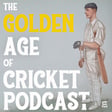
'Ranji' – Part 2 – with Simon Wilde
In the second part of my chat with The Sunday Times cricket correspondent, Simon Wilde, we discuss Ranjitsinhji's batting style and how he changed the appearance of 'batsmanship', the fluctuating fortunes of his only Test tour - that to Australia in 1897-98, his dramatic drop in form in 1902, and his less than successful return to cricket in 1920 with only one eye.
ABOUT SIMON WILDE:
Simon Wilde has covered five cricket World Cups and more than 250 England Test matches as the cricket correspondent of The Sunday Times. He has written 12 books, including the bestselling England: The Biography, which chronicles the story of the men's national team since 1877, and his latest publication is The Tour: The Story of the England Cricket Team Overseas 1877-2022. His biography Ranji: The Strange Genius of Ranjitsinhji was shortlisted for The William Hill Sports Book of the Year Award.
CREDITS:
Presenter & Producer: Tom Ford
All music used in podcast comes from the University of California Santa Barbara's remarkable collection of wax cylinder's from the late nineteenth and early twentieth centuries, which are free to download and use. You can donate to the upkeep of these recordings via their website.


